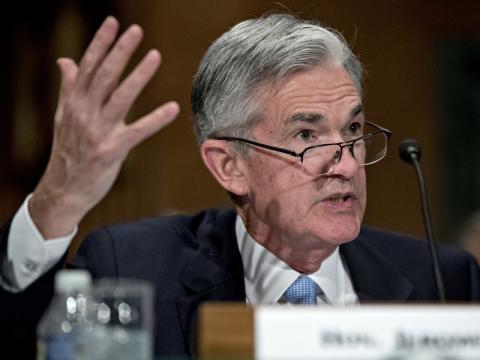Share
Jerry Powell Will Soon Be The Federal Reserve Chair. Who Is He?

Last week, Trump named Jerome Powell to be the next chair of the Federal Reserve.
If confirmed by the Senate, Powell, 64, will succeed Janet Yellen — the first woman to head the Fed — whose term expires in February. Powell, a current member of the Fed's board of governors, is expected to pursue policies largely in line with the gradual interest rate hikes of the Yellen-led Fed.
Powell, a Republican, was nominated for his post as Fed governor in 2012 by President Barack Obama. Unlike recent Fed chairs, Powell is not a Ph.D. economist but a lawyer. Prior to coming to the Fed, Powell was an investment banker. He was a partner at the highly successful, Washington-based private equity firm The Carlyle Group.
As Fed chair, Powell would assume the position many describe as the second most powerful in the United States. That's because with its ability to influence interest rates the Fed holds great sway over the U.S. economy, job creation and the rate of inflation.
This is the first time in decades that a president hasn't reappointed a chief of the central bank for a second term.
Every president since Ronald Reagan who has had the opportunity to reappoint a Fed chair initially appointed by a president of the opposing party has done so. Reagan, a Republican, reappointed Paul Volcker, who was first appointed by Jimmy Carter, a Democrat. Bill Clinton, a Democrat, reappointed Alan Greenspan, who was initially appointed by Reagan. And Bernanke, who was first appointed by Republican George W. Bush, was reappointed by Barack Obama, a Democrat. Yellen succeeded Ben Bernanke in 2014. Trump's decision not to reappoint her to a second term is a departure from the nonpartisan approach of U.S. presidents during the past nearly four decades.
As of now, it appears monetary policy will remain relatively the same.
As a Fed governor, Powell has supported the policies of the Yellen Fed, which has only gradually raised official interest rates after leaving them near zero for seven years after the financial crisis. "If the economy performs about as expected, I would view it as appropriate to continue to gradually raise rates," Powell said in a speech before the Economic Club of New York earlier this year. Most analysts expect him to move rates higher at about the same pace as Yellen.
Powell's public comments on financial regulation haven't been perfect, but are fairly reasonable considering he is a Republican. Hopefully he maintains this.
...Powell has been supportive of the Dodd-Frank reforms, though.... suggested there may be room for some streamlining. "Powell favors less regulatory burdens on banks" than Yellen, economist Mickey Levy of Berenberg Capital Markets says....
Powell said, "There is certainly a role for regulation." But, he added, "more regulation is not the best answer to every problem." "While post-crisis improvements in regulation and supervision have helped us to achieve these gains, I will continue to work with my colleagues to ensure that the Federal Reserve remains vigilant and prepared to respond to changes in markets and evolving risks," he said.
In general, this is not the end of the world, especially as Trump appointees go.
Among those who have worked with Powell, there’s much goodwill. One Democratic economist (who would have preferred that Yellen be nominated for a second term and wishes to remain anonymous) put it this way: “He’s a wonderful guy and gets along well with people. He’s played a conciliatory role. He’s intelligent and not an ideologue.”
Sources:
Image Credit: Getty Images
